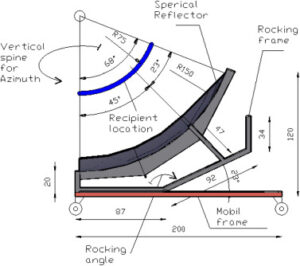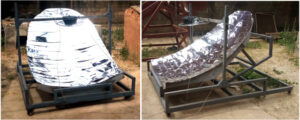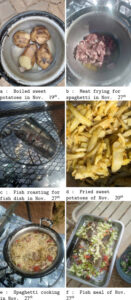Nouvelle parution : Conception, realization and testing of a solar cooker built with a spherical reflector in Burkina Faso
Highlights
•Hemispherical reflector is dimensioned, studied and conceived for cooking purpose.
•The reflector is mounted on a frame with rollers to track the azimuth only for all localities.
•For equatorial and tropical localities where the sun goes beyond a certain height, the reflector can tilt to catch the sunrays.
•Experiments are conclusive.



Abstract
A system was conceived, realized and tested for solar cooking purpose. It has a spherical shape reflector as concentrator, mounted on two frames for a better orientation towards the sun. The engineering of the system makes it able to reach theoretical geometrical mean concentration of 720 and a theoretical efficiency of 0.42. Thus, the system is easy to manipulate since only the azimuth angle is tracked. An optional rocking of the reflector also allows the system to be used in equatorial and tropical zones when the sun goes closer to the zenith. Series of tests were conducted around November 20th, in Ouagadougou, Burkina Faso with a latitude angle of 12.21. Experiments on oil in a pot allowed it to reach successively a maximum temperature of 184°C at 1:00pm the first day and at 221°C 1:30pm the second day. Boiled sweet potatoes, fried sweet potatoes, spaghetti and fish dishes were cooked in a reasonable amount of time and ready for lunch. Water tests were also conducted around March 14th following the protocol, and allowing comparison with other systems. In conclusion, experiments were taken without rocking the system and by only tracking the azimuth angle. The water result gives convincing outcomes in comparison with other concentrating cooking systems. Most of all, sub-Saharan users will not have to change their habits: the system, by always concentrating, is less constricting for tracking the sun and less time consuming to manipulate. Finding the focal point and eye safety issues shall be addressed, but overall indicators, including financial one, give more credit for the system to be implemented in sub-Saharan region.
https://www.sciencedirect.com/science/article/pii/S0038092X24001919?
